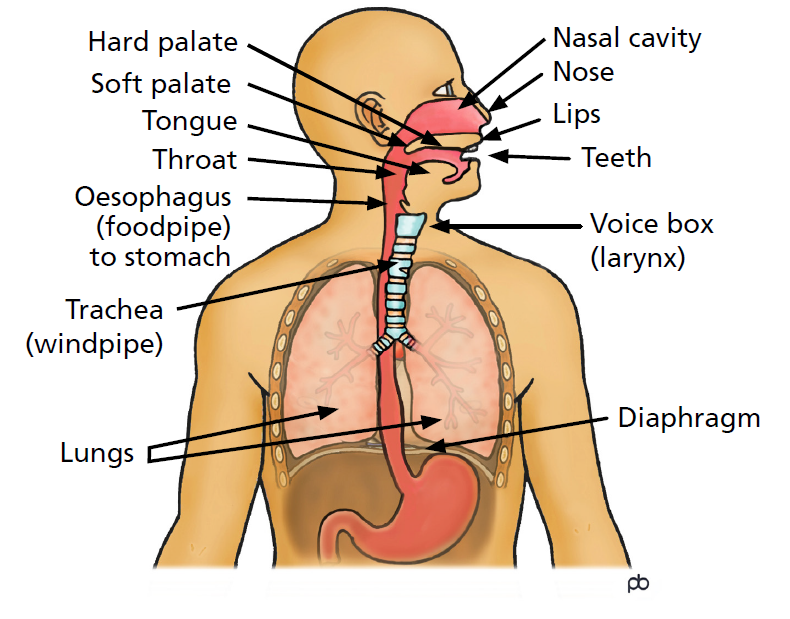How is the voice produced?
The voice is generated by air from the lungs. When we speak air flows from the lungs, up the wind pipe and passes through the larynx (voice box). There are two vocal cords in the larynx and the air makes the vocal cords vibrate.
This vibrating column of air is then shaped into speech sounds by the tongue, teeth, jaw and lips.
The spaces of the chest, throat, mouth and nose modify and resonate the sound produced by the vocal cords. As we are all slightly different in size and shape, our voices resonate differently and we each have our own individual, recognisable voice.
The organs of speech

Why do people have problems with their voices?
- Over-using their voice, shouting, talking over noise and generally forcing for sound.
- Continual coughing and throat clearing.
- Untrained singing, Karaoke singing.
- Stress and anxiety.
- Poor posture.
- Arthritis of the neck, shoulder or spine may be a factor.
- Asthma or other breathing difficulties.
- Smoking or smoky environment.
- Irritations from fumes or dust.
- Acidity, reflux from the stomach.
- In many, if not most cases, there is a combination of factors contributing to the voice problem.
Some do’s
- Do gentle exercises of the head, neck and shoulders to help reduce tension.
- Do rest the voice as much as possible.
- Do take time to speak and remember to breathe.
- Do try to relax.
- Do make notes on your voice; when it is good and when it is bad, this can provide an insight into your problems.
- Do have some ventilation at home.
- Do avoid smoky, dry, dusty atmospheres.
- Do try silent yawning. This helps relax the back of your throat.
- Do sip water frequently. This is essential to lubricate your throat.
- Do use steam inhalation to lubricate and clear the nose and throat.
Some don’ts
- Don’t shout or force your voice.
- Don’t talk over loud background noise.
- Don’t throat clear or cough; Instead, sip water, swallow hard and suck on a boiled sweet.
- Don’t suck strong cough lozenges as these only irritate the throat.
- Don’t drink too many caffeinated drinks.
- Don’t smoke.
- Don’t let tension build up.
Further information
This section is titled ‘Additional advice’ and will be completed on your physical copy of your leaflet.
Help us get it right
If you have a complaint, concern, comment or compliment, please let us know by speaking to a member of our staff. We learn from your feedback to use the information to improve and develop our services.
If you would like to talk to someone outside the service, please contact the Patient Advice and Liaison Service (PALS)
Tel: 0113 206 6261
Textphone: 07468 753 025 (if you are deaf or speech impaired)